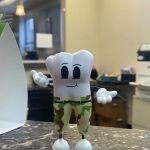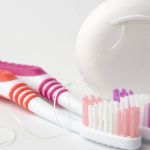Maintaining Oral Health with Limited Mobility in Seniors: Tips for Better Care
As a caregiver for my elderly parents, one of the challenges I faced was ensuring they maintained good oral health despite having limited mobility. It's easy to overlook the importance of oral hygiene, especially in seniors who have difficulty moving or performing daily tasks. However, I quickly realized that oral health is just as important as physical health in the elderly, and it can significantly affect their overall well-being.
Maintaining oral health in seniors with limited mobility can be difficult, but it’s not impossible. In fact, with the right tools, strategies, and a little help, it’s entirely feasible to ensure that seniors can keep their mouths clean, healthy, and free from dental problems. In this article, I’ll share tips and techniques that I’ve learned along the way to help seniors maintain their oral health, despite mobility challenges.
1. The Importance of Oral Health in Seniors
Oral health plays a critical role in overall health, particularly for seniors. Poor oral hygiene can lead to a variety of issues, including gum disease, cavities, and even tooth loss. Additionally, oral health can impact other areas of the body, such as heart health and diabetes management. In seniors with limited mobility, the ability to brush and floss regularly may be compromised, leading to an increased risk of oral health problems. This is why it's crucial to establish a routine that makes dental care as accessible as possible.
As I experienced with my parents, seniors with limited mobility are often unable to perform tasks like brushing or flossing effectively, which can cause plaque to build up and lead to gum disease. Gum disease, in turn, can lead to pain, infections, and even tooth loss, which can severely affect the senior's ability to eat, speak, and live comfortably. Taking care of oral health is not just about keeping teeth and gums healthy—it's about ensuring that seniors can continue to enjoy a good quality of life.
2. The Challenges of Oral Care with Limited Mobility
Seniors with limited mobility may have difficulty with the fine motor skills required to brush and floss properly. For some, arthritis or joint pain can make holding a toothbrush or flossing thread a painful or nearly impossible task. Others may struggle with standing or bending over to reach their mouth properly. These physical limitations make it easy to understand why maintaining oral health can be challenging for seniors.
One challenge I encountered while caring for my parents was ensuring they could brush their teeth without discomfort. My mother, for instance, had difficulty holding a toothbrush due to arthritis in her hands. This made it impossible for her to brush her teeth effectively without assistance. Similarly, my father struggled to bend over to reach his teeth due to mobility issues caused by his knees and back. These struggles highlighted the importance of finding practical, comfortable, and effective ways to assist in their oral care routine.
3. Choosing the Right Oral Care Tools
One of the best ways to make oral care easier for seniors with limited mobility is to use the right tools. Thankfully, there are many products on the market designed specifically for elderly individuals or those with mobility challenges. These tools can help make brushing and flossing easier, even for those with arthritis, limited range of motion, or hand weakness.
Here are some oral care tools I found incredibly helpful when assisting my parents:
- Electric Toothbrushes: Electric toothbrushes are a game-changer for seniors with limited mobility. The rotating brush head does most of the work, making it easier for seniors to brush effectively. Some models even have built-in timers to ensure that they brush for the recommended two minutes.
- Toothbrush with Large Handles: For seniors who struggle with grip strength, a toothbrush with a large, ergonomic handle can provide better control and comfort. Some toothbrushes even have non-slip grips to make them easier to hold.
- Interdental Brushes: For seniors who have trouble with traditional flossing, interdental brushes are a fantastic alternative. These small brushes can easily reach between teeth and remove plaque, offering a more comfortable and efficient way to clean between teeth.
- Water Flossers: Water flossers, also known as oral irrigators, use a stream of pulsating water to remove food particles and plaque between teeth. This tool can be especially helpful for seniors with limited dexterity who have difficulty using traditional floss.
- Long-Handled Toothbrushes: For those with limited mobility in their arms or shoulders, long-handled toothbrushes can help reach the back of the mouth without straining or having to bend over.
By selecting the right tools, seniors can improve their oral care routine, making brushing and flossing more effective and less stressful.
4. Establishing a Routine
Establishing a consistent oral care routine is essential for seniors, especially those with limited mobility. Having a set routine not only ensures that oral health is maintained but also helps to make the process feel like a regular part of the day. When my parents and I worked together to set up their daily oral care routine, we made sure to keep it simple, quick, and easy to follow.
Here’s the basic routine I’ve found to work best for seniors with limited mobility:
- Morning and Night Brushing: Brush teeth twice a day—once in the morning and once before bed. Use a soft-bristled electric toothbrush to gently clean teeth and gums.
- Flossing Once a Day: If possible, floss once a day to remove any debris between the teeth. If traditional flossing is difficult, try an interdental brush or water flosser.
- Rinsing with Mouthwash: Use mouthwash after brushing to help kill bacteria and freshen breath. Choose a mouthwash with fluoride for added protection against cavities.
- Regular Dentist Visits: Make sure that seniors have regular dental check-ups. Even if mobility is limited, it’s important to see a dentist at least once every six months for a thorough cleaning and check-up.
When helping seniors establish a routine, remember to be patient and encouraging. The goal is to make the process as easy and comfortable as possible while ensuring that they understand the importance of keeping their teeth and gums healthy.
5. The Role of Diet in Oral Health
While good oral hygiene is essential, a balanced diet also plays a significant role in maintaining oral health, especially for seniors. Foods that are high in calcium, vitamins, and antioxidants can help protect teeth and gums, while sugary or acidic foods can contribute to tooth decay and gum disease.
To support my parents' oral health, I made sure they ate a diet rich in fruits, vegetables, lean proteins, and dairy products. Dairy is especially important because it helps to strengthen teeth and bones due to its calcium content. Additionally, drinking plenty of water helps keep the mouth hydrated and washes away food particles and bacteria. I also encouraged them to avoid sugary snacks and beverages, as these can contribute to cavities and gum issues.
6. Seeking Professional Help
Even with the best efforts, some seniors may still struggle with maintaining oral health due to limited mobility. In these cases, seeking professional help can be invaluable. Many dentists and dental hygienists offer at-home visits for patients who have difficulty traveling to the office. These visits can include cleanings, exams, and guidance on maintaining good oral hygiene. Additionally, some senior care programs offer dental care as part of their services, so it’s worth exploring these options if you or your loved one requires extra support.
When caring for seniors with limited mobility, it’s important to have a team of professionals who can provide the necessary care and guidance. Don’t hesitate to reach out to a dentist for advice on how to best maintain oral health at home.
Maintaining oral health with limited mobility can be challenging, but with the right tools, routine, and support, it’s possible to ensure that seniors can enjoy healthy teeth and gums for years to come. By focusing on the basics—proper brushing, flossing, a balanced diet, and regular professional care—you can help seniors maintain their oral health and enhance their quality of life.
For more tips and information on oral health, visit Dentistry Toothtruth to find the best dental care solutions for seniors.







 Family and Cosmetic Dentistry of Randolph, Dr. Anthony Fusco & Dr. Joseph Caravano5.0 (280 review)
Family and Cosmetic Dentistry of Randolph, Dr. Anthony Fusco & Dr. Joseph Caravano5.0 (280 review) Greater Portland Endodontics5.0 (14 review)
Greater Portland Endodontics5.0 (14 review) California Dental Group4.0 (235 review)
California Dental Group4.0 (235 review) Baystate Family Dental4.0 (27 review)
Baystate Family Dental4.0 (27 review) Khisti Dental Center at Chester5.0 (109 review)
Khisti Dental Center at Chester5.0 (109 review) Stacey P. Blau, DDS0.0 (0 review)
Stacey P. Blau, DDS0.0 (0 review) The Importance of Oral Health Education During Pregnancy for a Healthy Pregnancy
The Importance of Oral Health Education During Pregnancy for a Healthy Pregnancy Best Tips for Brushing Your Teeth Properly for Healthy Gums: Essential Techniques for Oral Health
Best Tips for Brushing Your Teeth Properly for Healthy Gums: Essential Techniques for Oral Health Why Skipping Dental Checkups Can Lead to Bigger Oral Health Problems
Why Skipping Dental Checkups Can Lead to Bigger Oral Health Problems Advantages of Porcelain Dental Restorations
Advantages of Porcelain Dental Restorations How Can Diabetes Cause Tooth and Gum Problems? Preventing and Managing Oral Health Issues
How Can Diabetes Cause Tooth and Gum Problems? Preventing and Managing Oral Health Issues Healthy Habits for Promoting Good Oral Health and Hygiene: Tips for a Healthy Smile
Healthy Habits for Promoting Good Oral Health and Hygiene: Tips for a Healthy Smile